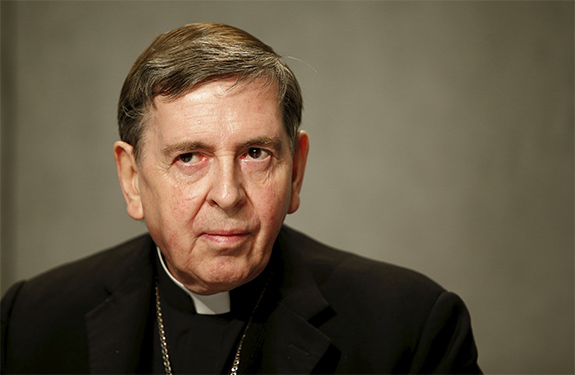“The lecture of Pope Benedict XVI in Regensburg was in fact prophetic,” says the head of the Pontifical Council for Promoting Christian Unity, “because it called attention to a sore spot in Islam.”
CWR Staff
Editor’s note: The following in Part 2 of interview with Cardinal Kurt Koch, head of the Pontifical Council for Promoting Christian Unity, conducted by Armin Schwibach and published at kath.net on July 20, 2016. Part 1 of this interview, “The Problem of Europe’s Weak Christianity”, was published on CWR on July 21st. The interview has been translated for CWR by Michael J. Miller.
September 12 will be the tenth anniversary of the “Regensburg Address” by Benedict XVI on “Faith and Reason” at the University of Regensburg. Although on that occasion the Pope had dedicated only a few words to the problem of “Islam” as an introduction to a wide-ranging reflection, they were taken by some of the mainstream media as a pretext to depict Benedict XVI as an “enemy” of Islam with a “Crusader mentality”. The Pope’s real concerns faded into the background. Despite all the accompanying misunderstandings, though, one result was more in-depth conversations between the Catholic Church and high-ranking representatives of Islam. The foundation of these talks was the Pope’s view that interreligious dialogue cannot be theological dialogue but must be intercultural dialogue.
Where, in today’s dramatic situation (terrorism, ISIS, the increasing radicalization of Islam, mass immigration especially of young people, the rejection of certain achievements of an enlightened Western culture that has also lost its compass), do you see the opportunity that should be seized, according to the prophetic insight of Benedict XVI?
Cardinal Koch: The lecture of Pope Benedict XVI in Regensburg was in fact prophetic, because it called attention to a sore spot in Islam. Of course the talk was not primarily about a conflict with Islam, but rather about the question of the relation between faith and reason, which in the thought of Pope Benedict always includes the Greek mind also. Therefore he spoke mainly about several waves of de-Hellenization in the Reformation, in liberal theology and in today’s encounter with the diversity of cultures.
Pope Benedict’s lecture was prophetic especially in two respects: On the one hand, even in interreligious dialogue there must be the courage to engage in intellectual, rational argument. In this regard, the Christian-Islamic conversation has a lot of catching up to do. For example, nowadays some people like to talk about Judaism, Christianity and Islam as the three Abrahamic religions, while at the same time hiding the fact that their ways of understanding Abraham are quite different. The central point of the intellectual argument is what Islam considers to be the original sin of Christianity, namely the association of another person with God. For Islam, to say that God has a Son is unacceptable. The dialogue cannot disregard this fundamental difference. Rather, the topic must be addressed directly, so as not to reinforce latent hostilities.
Within the context of his lecture, Pope Benedict XVI also got around to speaking about the relation between religion and violence, and he demanded that faith must be compatible with reason. Most importantly, he expressed his conviction that acting irrationally contradicts God’s nature. This is connected also with his central message that the twin sister of religion is peace and in no instance violence. When we are forced today to witness how much violence and terror is perpetrated in the name of religion, then we experience first-hand how prophetic those statements by Pope Benedict XVI were ten years ago in Regensburg.
With his lecture, Benedict XVI was able to initiate an incisive dialogue, which was taken up by various Muslim scholars, and with that he made possible a new encounter between Christianity and Islam. For dialogue and encounter cannot be separated from each other. The immediate encounter between representatives of different religions is the prerequisite for the possibility of starting a dialogue at all. It would be problematic, then, to remain at the level of encounter and never to get to a more in-depth argument about substantial matters, too; the purpose of working through the perennial problems is to arrive at a new form of coexistence. This is what Pope Benedict wanted to kick off. Even though this was scarcely noticed at first, and his statement in Regensburg unfortunately sparked an irrational escalation of violence, later on there was after all a response to the real inquiry made by Pope Benedict XVI, and this is worth developing further.
Covenant between Love and Reason is the title of a newly published book that you wrote on the legacy of the magisterium of Benedict XVI, which is not just the legacy of a Pope, but the legacy of one of the greatest theologians of our time on the Chair of Saint Peter. Recently Pope Francis, in a foreword to a book, compared the ministry and teaching of his predecessor to that of Leo the Great, a Doctor of the Church.
In discussing the comprehensive thought of Benedict XVI, what idea or themes do you try to emphasize in particular? Can you agree with the motto, “Caritas et Misericordia in Veritate” [“Charity and Mercy in the Truth”], and if so: how does Benedict XVI describe this relation?
Cardinal Koch: I am very happy about the Foreword by Pope Francis and his speech in the Sala Clementina. I hope that the way in which Pope Francis honored Pope emeritus Benedict will be perceived by the public as a sign of their spiritual closeness, despite the constant attempts to play them off against each other. On the contrary, in his recently published interview with Jacques Servais about the doctrine of justification, Pope Benedict XVI emphasized that for him it is a sign of the times that the idea of God’s mercy is taking an increasingly predominant place and that Pope Francis is thoroughly aligned with the tradition of the centrality of Divine Mercy. Conversely, Pope Francis, in his conversation with Andrea Tornielli, referred also to Pope Benedict, for whom God’s mercy is the essential core of the Gospel, the very Name of God, so to speak. In this sense there is a foundational continuity, which you expressed in the formula “Caritas et misericordia in veritate”; people should become much more clearly aware of this.
Finally, the speech that the Pope emeritus gave at the celebration of his sixty-fifth priestly jubilee in the Sala Clementina of the Apostolic Palace once again was centered on the Eucharist, the new creation through the passion, death and resurrection of Christ, the “transubstantiation” of the world. Is Benedict XVI the “Eucharistic Pope”?
Cardinal Koch: That short but substantial speech by Pope emeritus Benedict XVI in the Sala Clementina contained the essence of what he communicated as his message. You summarized this in the concept of the “Eucharistic Pope”. In fact, the Eucharist has played a central role since the beginning of Joseph Ratzinger’s theological work. Already in his doctoral dissertation on the concept of Church in the writings of Saint Augustine he ventured to synthesize the idea of the Church as the people of God with the understanding that it is the Body of Christ, in the sense that the Church should be understood as the people of God that lives on the Body of Christ. For the Eucharist is not just a sacrament that the Church celebrates; rather, it constitutes the Church, as Pope Saint John Paul II later expressed this view in his Encyclical Ecclesia de Eucharistia.
Next, the Eucharist plays an important role in Ratzinger’s understanding of the primacy of the Bishop of Rome. Again and again Benedict XVI pointed out that the primacy should not be understood primarily in jurisdictional terms, but rather in terms of the Eucharist. This view, that the primacy of the Bishop of Rome is not an external addition to Eucharistic ecclesiology but one of its intrinsic elements, is naturally foundational and helpful especially in the dialogue with the Orthodox Churches. Thereby Pope Benedict XVI built an important bridge to the Churches of Orthodoxy.
The central importance of the Eucharist in the theology of Pope Benedict XVI reveals also the inmost core of the liturgy. Since the Eucharist has been given to us as a gift and since we thank God in it, we ourselves do not celebrate the liturgy, but God does. This explains the primacy of the katabatic [from-above] dimension of the liturgy, which of course calls for its anabatic [from-below] dimension as man’s response to God’s salvific initiative. This Eucharistic indebtedness is evident also in Ratzinger’s understanding of divine revelation, which we cannot invent; rather it is given to us gratuitously, and we must ponder it. Hence Benedict XVI sees his theology as a reflection on the revelation of God in Jesus Christ and thus as a science of belief. Or, as he himself once put it: “Just as I learned to understand the New Testament as the soul of theology, so too I saw the liturgy as its life-giving soil, without which it would necessarily dry up.” Consequently, the centrality of the Word of God and of the liturgy can be understood correctly only in terms of the Eucharistic dimension of the faith. Handing on and keeping alive such essential insights of the magnificent theology and rich magisterium of Pope Benedict XVI is the purpose of my book, which by its title, Covenant between Love and Reason, intends to point to the core concerns of Pope Benedict XVI.
http://www.catholicworldreport.com/Blog/4944/the_greatness_of_benedict_xvi_an_interview_with_cardinal_kurt_koch_part_2.aspx















